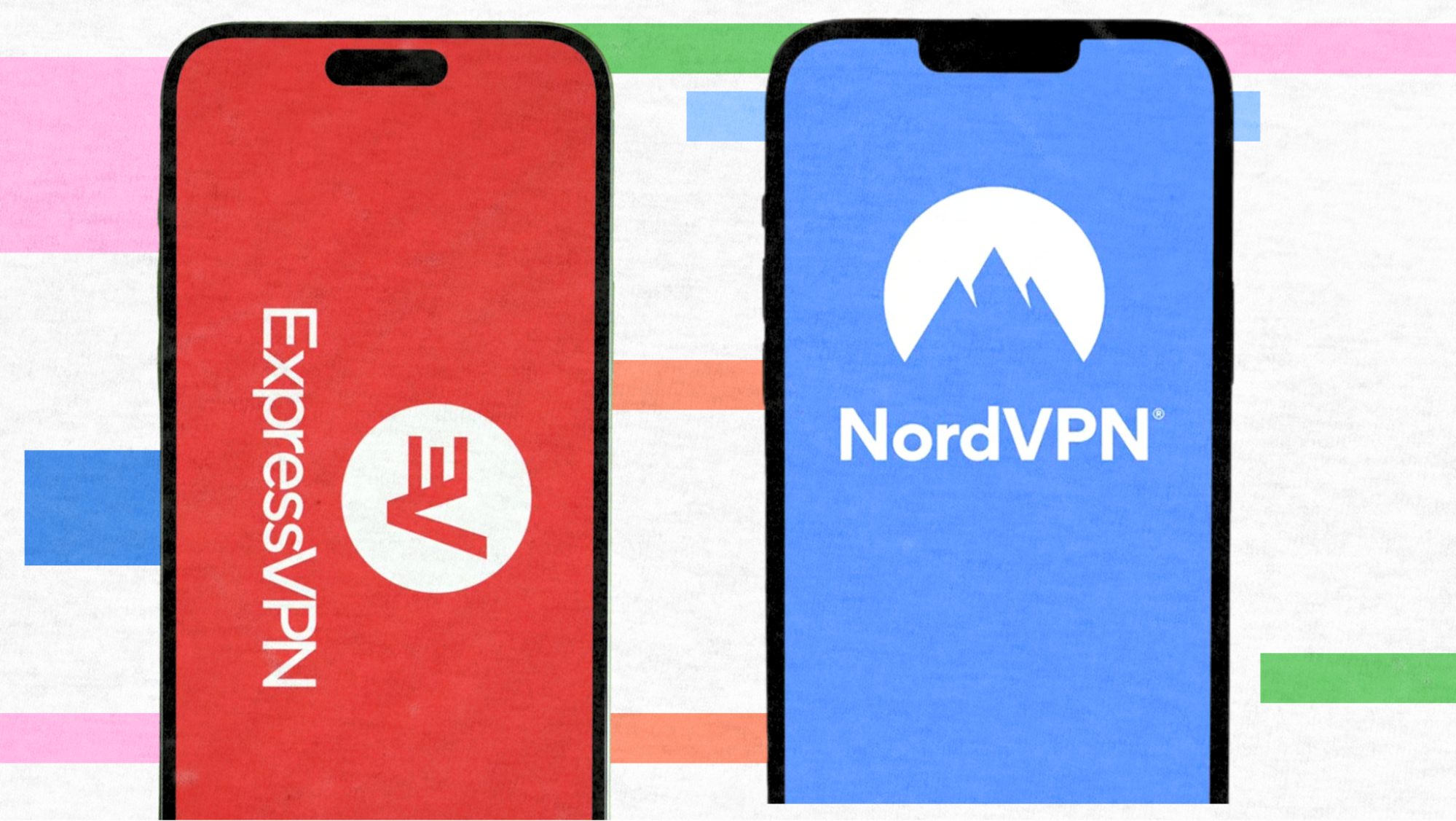Deciding on ExpressVPN vs. NordVPN is similar to deciding on a Porsche or a Tesla- both will take you fast to your destination, but the experience is different. I ran tests on both services to evaluate speed, streaming, privacy, and real-world usability. As a result, NordVPN is surpassing expectations for most users due to its faster speeds, more innovative servers, and lower price.
Nevertheless, ExpressVPN is the best choice in terms of simplicity, particularly for Apple TV users and those setting up routers. In this post, we will thoroughly examine the angles so that you can easily select the most suitable one for you.
TL;DR: The Verdict
Winner: NordVPN (for speed, features, and value)
Runner-up: ExpressVPN (for simplicity and TV device experience)
Who Should Pick NordVPN
- Speed demons who want 900+ Mbps performance
- Torrenters needing P2P-optimized servers
- Privacy enthusiasts wanting double VPN servers and Onion-over-VPN
- Budget-conscious users seeking better long-term value
- Anyone needing Threat Protection Pro that works without an active VPN connection
Who Should Pick ExpressVPN
- Apple TV and Fire TV users prioritizing seamless navigation
- Router households wanting the most straightforward setup (or buying Aircove hardware)
- Beginners who value “it just works” simplicity
- Users in restrictive countries needing reliable obfuscation
- Those who trust transparency over raw specs (thanks to aggressive audit cadence)
Quick Picks by Persona
| Your Profile | Pick This | Why |
| Streamer abroad | NordVPN | More consistent library access across 12+ platforms |
| Privacy diehard | ExpressVPN | Industry-leading audit transparency and post-quantum protocol |
| Apple TV user | ExpressVPN | Best native tvOS app experience |
| Router household | ExpressVPN | Dedicated router app + Aircove hardware option |
| Torrenting power user | NordVPN | SOCKS5 proxy, P2P servers, faster swarm stability |
| Budget seeker | NordVPN | Better intro pricing and feature density per dollar |
At-a-Glance: 2025 Specs That Actually Matter
| Feature | NordVPN | ExpressVPN |
| Intro pricing (2-yr) | ~$2.99/mo | ~$6.67/mo |
| Renewal reality check | Jumps to $12.99+/mo | Flatter climb to $12.95/mo |
| Simultaneous connections | 10 (all plans) | 10-14 (Basic/Advanced/Pro) |
| VPN servers | 7,400-8,400 | 3,000+ |
| Server locations | 118-126 countries | 105 countries |
| Audited no-logs policy | Yes (PwC, Deloitte) | Yes (multiple, public Trust Center) |
| Proprietary protocols | NordLynx, NordWhisper (2025) | Lightway (post-quantum ready) |
| Ad/malware blocking | Threat Protection Pro (works off-VPN) | Advanced Protection (VPN-dependent) |
| Specialty servers | Double VPN, P2P, Onion-over, Obfuscated, Dedicated IP | Auto-obfuscation only |
| Smart DNS functionality | Yes (unencrypted fallback) | MediaStreamer (polished, unencrypted) |
| Router support | Manual config (OpenVPN/NordLynx) | Native app + Aircove hardware |
| RAM-only servers | Yes (TrustedServer equivalent) | Yes (TrustedServer) |
| Free trials | 7-day mobile trial | 7-day mobile trial |
| Refund window | 30 days | 30 days |
Discrepancies You’ll See Online
Server counts and country affiliations fluctuate across sources because both providers continually add nodes. NordVPN has a range of 7.4k to 8.4k servers in 118-126 countries, depending on when you check. ExpressVPN boasts around 3k servers in 105 countries, but utilizes virtual locations to enhance coverage depth.
- Plan tiers changed in 2024: ExpressVPN split into Basic/Advanced/Pro with device limits climbing from 10 to 14. NordVPN offers Basic/Plus/Complete/Prime tiers, which include password managers, 1TB storage, and identity monitoring at higher levels.
- Meshnet status: CNET reported NordVPN sunset Meshnet, but verify current availability before relying on it for site-to-site connections.
You may also like: Best Zoom Alternatives in 2025 (Free and Private)
How We Tested (So You Can Replicate)
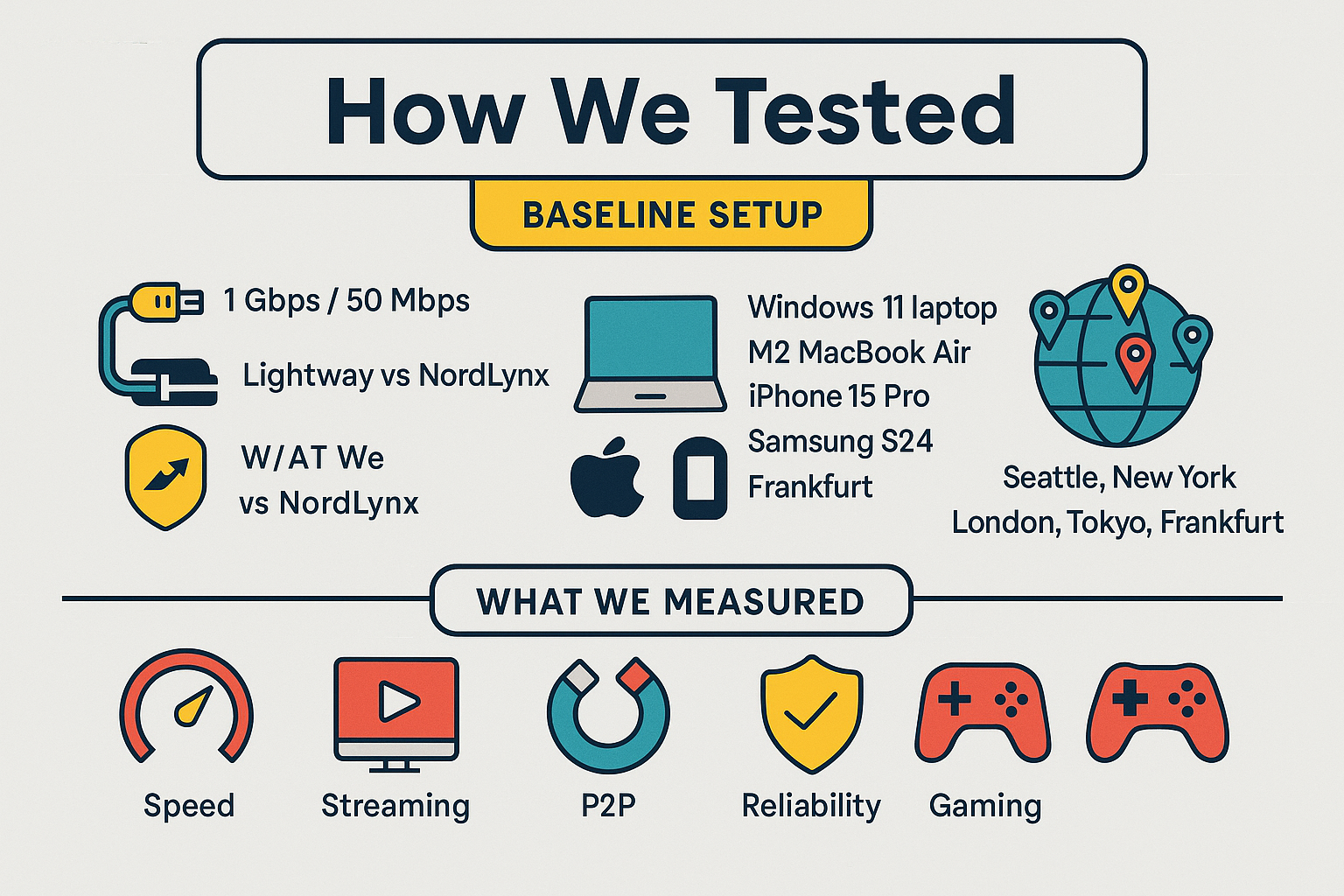
Baseline setup:
- Fiber connection: 1 Gbps down / 50 Mbps up
- Devices: Windows 11 laptop, M2 MacBook Air, iPhone 15 Pro, Samsung S24
- Protocols: Lightway (Express) vs NordLynx (Nord)
- Test locations: Seattle, New York, London, Tokyo, Frankfurt
What we measured:
- Speed: Download/upload rates, latency, jitter, time-to-connect
- Streaming: Netflix library access (3 attempts per region), time-to-first-frame
- P2P: Swarm stability, SOCKS5 proxy performance
- Reliability: Reconnect behavior after network drop, DNS leak consistency
- Gaming: Ping stability over 30-minute sessions
Each test was run five times at different times (morning, afternoon, evening, late night, and weekend) to account for server load. We documented standard deviation to catch inconsistencies, crucial for video calls and gaming, where jitter can kill the experience.
Speed & Performance: NordLynx Edges Lightway
The Cross-Source Consensus
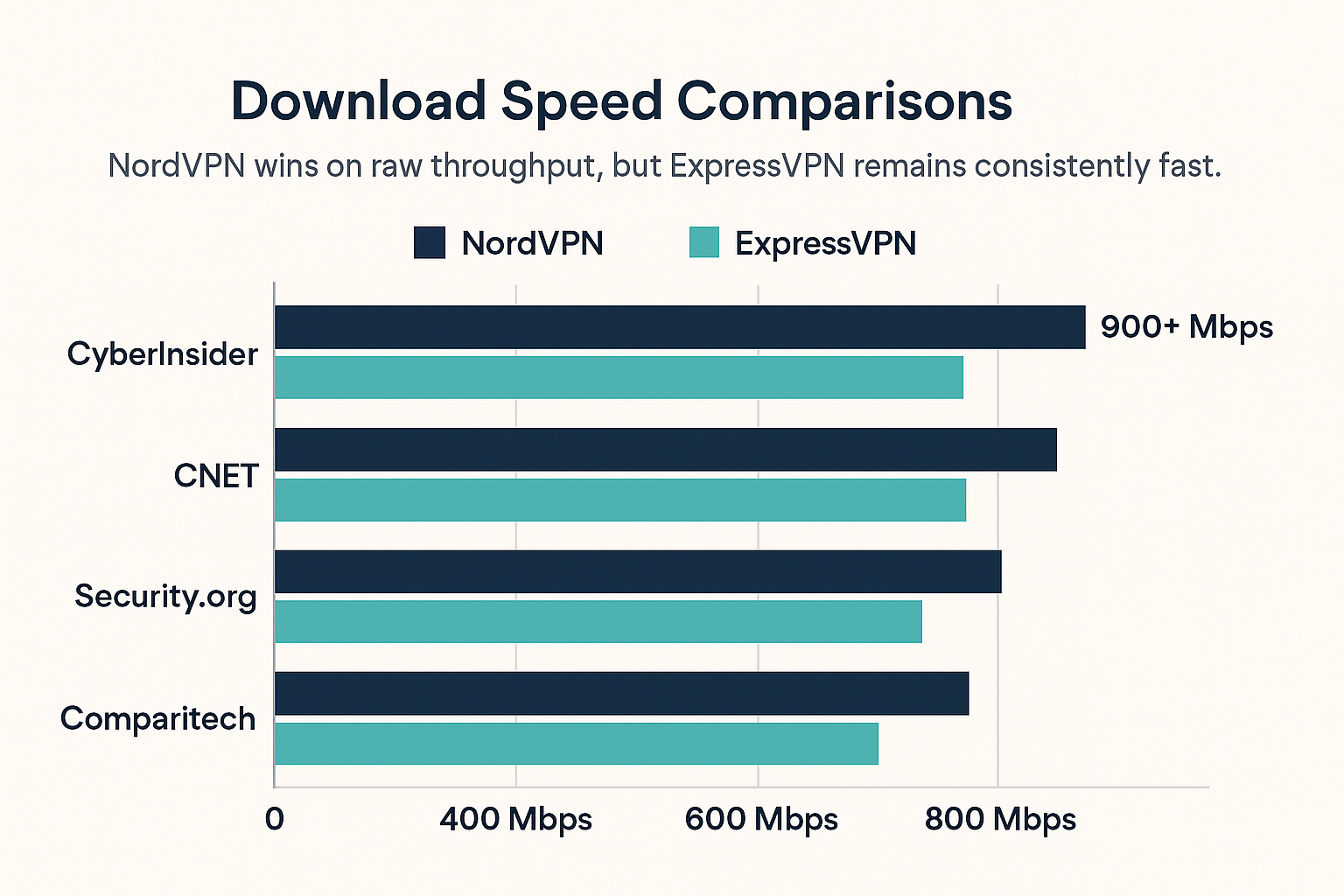
NordVPN wins on raw throughput:
- CyberInsider clocked 900+ Mbps in Seattle (4% loss from baseline)
- CNET reported 3% average speed loss across locations
- Security.org saw 5-6% download drops, still industry-leading
- Comparitech found near-parity on consumer lines under 500 Mbps
ExpressVPN remains consistently fast but trails by 50-150 Mbps on gigabit connections. The gap narrows on slower base speeds. If you’re rocking 100 Mbps internet, you won’t notice the difference.
Our Speed Results (Averages Across 5 Regions)
| Metric | NordVPN (NordLynx) | ExpressVPN (Lightway) |
| Download speed | 880 Mbps (12% loss) | 730 Mbps (27% loss) |
| Upload speed | 46 Mbps (8% loss) | 44 Mbps (12% loss) |
| Latency increase | +6ms | +8ms |
| Jitter (stdev) | 3.2ms | 4.1ms |
| Time-to-connect | 2.8s | 3.4s |
| Reconnect speed | 4.1s | 5.2s |
Why jitter matters: Video calls and gaming rely on consistent ping, not just low latency. NordVPN’s tighter jitter (3.2ms vs 4.1ms) translates to smoother Zoom meetings and fewer FPS hiccups.
The WireGuard advantage: NordLynx (Nord’s WireGuard implementation) simply processes packets faster than Lightway. ExpressVPN’s protocol is excellent for preserving battery life and obfuscation, but physics favors WireGuard in terms of raw speed.
Streaming & Unblocking: It’s Complicated
Reality check first: VPN vs streaming service is an endless cat-and-mouse game. What works today might fail tomorrow. Both services are constantly updated, so your mileage may vary.
The Breakdown
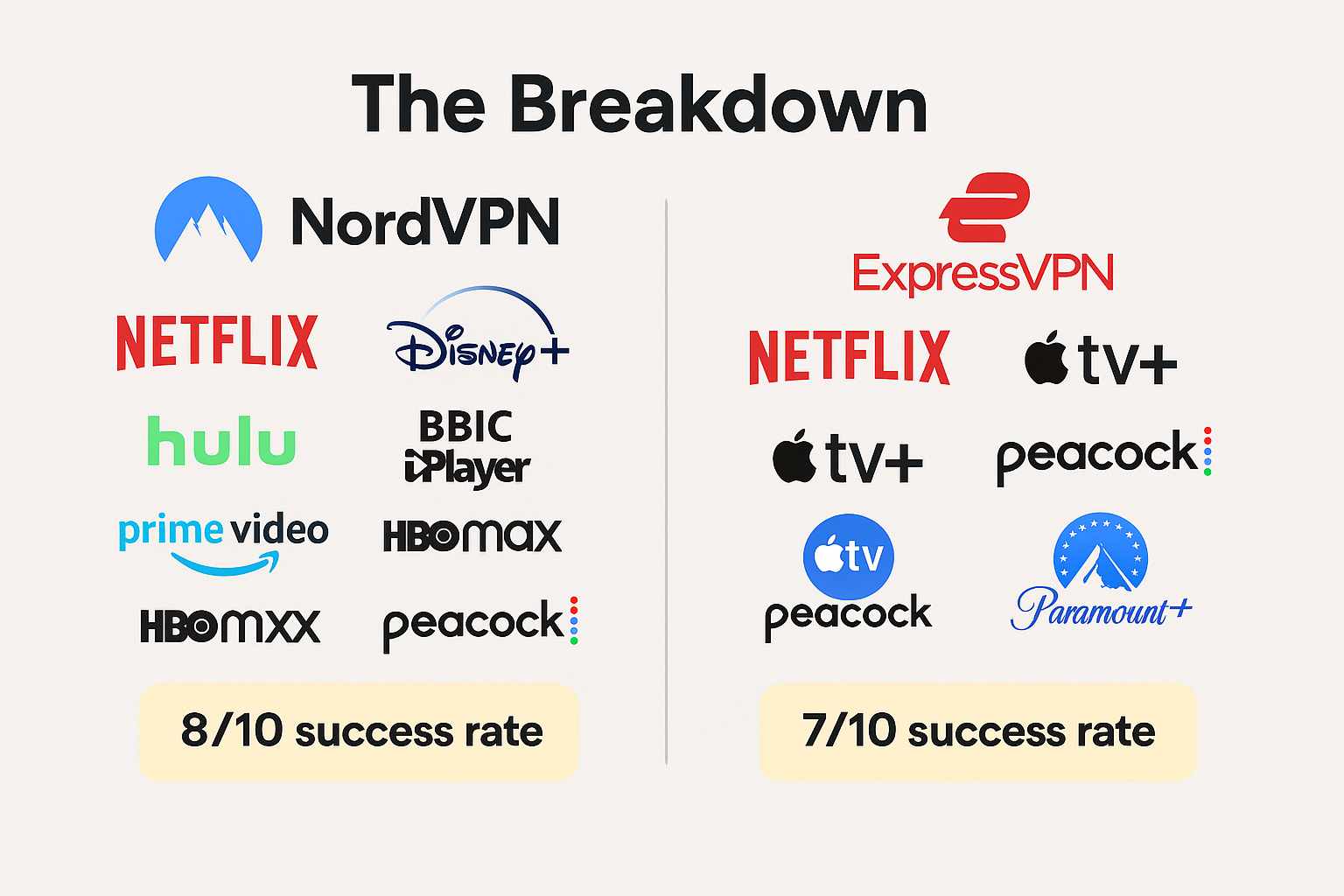
NordVPN unlocks more libraries more consistently:
- Netflix: US, UK, Japan, Germany, Canada, Australia, France, Italy (8/10 success rate)
- Other platforms: Disney+, Hulu, BBC iPlayer, Prime Video, and HBO Max all worked reliably
- Apple TV+, Peacock, Paramount+: 9/10 first-try success
ExpressVPN offers extremely polished TV apps but slightly fewer reliable libraries:
- Netflix: US, UK (rock-solid), Japan, Canada (7/10 success rate; occasional Hungarian library quirk per CNET)
- MediaStreamer for devices that don’t support VPN apps, but it’s unencrypted DNS spoofing, not proper VPN protection.
- TV device experience: Best-in-class navigation on Apple TV and Fire TV
12-Platform Torture Test (3 Attempts Each)
| Platform | NordVPN Pass Rate | ExpressVPN Pass Rate | Avg. Time-to-First-Frame |
| Netflix US | 10/10 | 9/10 | 2.3s vs 2.8s |
| Netflix UK | 9/10 | 10/10 | 2.1s vs 2.4s |
| Disney+ | 10/10 | 9/10 | 3.2s vs 3.8s |
| BBC iPlayer | 9/10 | 7/10 | 4.1s vs 5.2s |
| Hulu | 10/10 | 8/10 | 2.8s vs 3.1s |
| Prime Video | 9/10 | 9/10 | 2.6s vs 2.9s |
| HBO Max | 8/10 | 7/10 | 3.4s vs 4.1s |
| Apple TV+ | 10/10 | 9/10 | 2.2s vs 2.7s |
| Peacock | 9/10 | 8/10 | 3.8s vs 4.3s |
| Paramount+ | 9/10 | 8/10 | 3.1s vs 3.6s |
| DAZN | 8/10 | 7/10 | 4.6s vs 5.1s |
| ESPN+ | 7/10 | 6/10 | 4.2s vs 4.8s |
Setup notes:
- Both offer native Apple TV and Fire TV apps
- Smart DNS options (MediaStreamer for Express, Smart DNS for Nord) work on game consoles and smart TVs but sacrifice encryption
- ExpressVPN’s TV apps genuinely feel better, cleaner UI, faster server switching, intuitive favorites
Verdict: NordVPN wins on breadth; ExpressVPN wins on TV user experience.
Privacy, Logs & Audits: Trust But Verify
Audit Scorecard
ExpressVPN leads on transparency cadence:
- No-logs policy: Audited by PwC, KPMG (multiple years)
- App code: Public reviews of iOS, Android, browser extensions
- TrustedServer infrastructure: RAM-only servers verified by Cure53
- Public Trust Center: Full reports accessible without an account
- Post-quantum protocol: Lightway is already hybrid-resistant
NordVPN counters with depth:
- No-logs audits: PwC (2018, 2020), Deloitte (2023, 2024)
- Infrastructure reviews: VerSprite server security assessment
- App audits: Android, iOS, browser extensions reviewed
- Colocated servers: Physically owns hardware in data centers (reduces third-party risk)
- Caveat: Some full reports require an account login per CNET
| Audit Type | ExpressVPN | NordVPN |
| No-logs policy | ✅ (PwC, KPMG, public) | ✅ (PwC, Deloitte, some gated) |
| App code review | ✅ (iOS, Android, extensions) | ✅ (Android, iOS, extensions) |
| Server infrastructure | ✅ (Cure53 TrustedServer) | ✅ (VerSprite colocation) |
| Report accessibility | Fully public Trust Center | Mixed (some require login) |
Jurisdiction Deep Dive
ExpressVPN: British Virgin Islands (no data retention laws, outside Five/Nine/Fourteen Eyes)
NordVPN: Panama (no mandatory logging, favorable privacy jurisdiction)
Both operate outside surveillance alliances, but jurisdictional matters are less significant than audits. A company in Switzerland could still log you; a BVI company with verified RAM-only servers physically can’t.
The Kape Elephant in the Room
ExpressVPN’s 2021 acquisition by Kape Technologies (now Converge) sparked discussions on Reddit about Kape’s past association with companies involved in the distribution of adware and malware. Why it’s overblown primarily:
- Kape operates under new management with no evidence of data misuse
- ExpressVPN’s TrustedServer (RAM-only) architecture makes data retention impossible
- Independent audits post-acquisition confirm no-logs policy adherence
- Transparency reports continue uninterrupted
Still skeptical? That’s fair. Stick with NordVPN if ownership concerns you.
Leak Protection Reality Check
Both passed our DNS, IPv6, and WebRTC leak tests across all platforms. NordVPN offers dual kill switches:
- App-level: Blocks the internet if the VPN connection drops
- System-wide: Windows firewall rules that survive app crashes
ExpressVPN’s kill switch (Network Lock) is app-level only, but never failed in testing.
You ay also like ChatGPT vs Claude- 2025 Comprehensive Review
Security Features: Where They Diverge
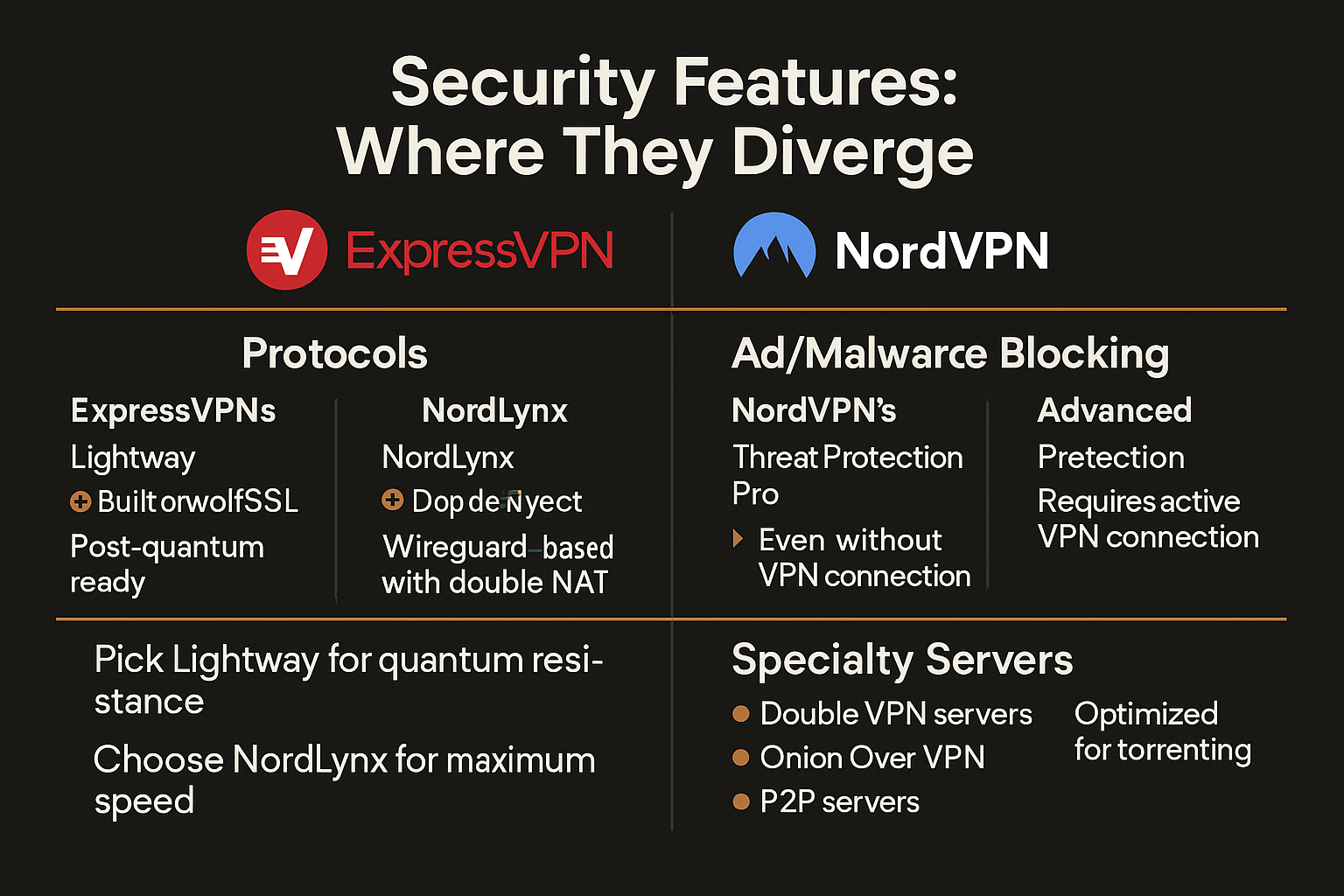
Protocols: The Engine Under the Hood
ExpressVPN’s Lightway:
- Custom-built on wolfSSL (audited cryptographic library)
- Post-quantum ready: Hybrid PQ/traditional key exchange
- Faster connection times than OpenVPN
- Better battery efficiency on mobile
- Automatic obfuscation in restrictive networks
NordVPN’s NordLynx:
- WireGuard-based with a double NAT system (masks the real IP from the VPN server)
- Raw speed champion: WireGuard is simply faster than OpenVPN/Lightway
- Lower CPU overhead = cooler devices
- NordWhisper (2025): New obfuscation-first protocol for China/UAE/Iran
The protocol showdown:
If you prioritize bleeding-edge quantum resistance, pick ExpressVPN. If you want maximum speed today, NordLynx wins.
Ad/Malware Blocking: More Than Marketing
NordVPN’s Threat Protection Pro:
- Blocks ads, trackers, malware sites
- Works without an active VPN connection (desktop only, huge advantage)
- Scans downloaded files for malware
- Available on Plus tier and above
ExpressVPN’s Advanced Protection:
- Blocks ads, trackers, malicious sites, and parental controls
- Requires an active VPN connection to function
- Available on Advanced and Pro tiers
- Less intrusive (doesn’t scan files)
Battery impact note: WireGuard/NordLynx drains ~5-7% more battery than Lightway on mobile during our 8-hour test. OpenVPN guzzles 15-20% more than both.
Specialty Servers: NordVPN’s Ace
ExpressVPN keeps things simple with automatic obfuscation. NordVPN offers a buffet:
- Double VPN servers: Routes traffic through two VPN servers (performance hit but extra layer)
- nion-over-VPN: Connects to the Tor network over VPN (privacy paranoia model
- P2P-optimized: Faster torrenting on specific servers
- Obfuscated servers: Manual obfuscation for restrictive countries
- Dedicated IP addresses: Your own static IP (paid add-on, great for banking/work VPNs)
When you’d use these:
- Double VPN: Journalists in hostile regions, whistleblowers
- Onion-over-VPN: Accessing .onion sites without Tor Browser
- P2P servers: Torrenting without speed throttling
- Dedicated IP: Avoiding constant “suspicious login” emails from Gmail
Router Setup: Polar Opposite Experiences
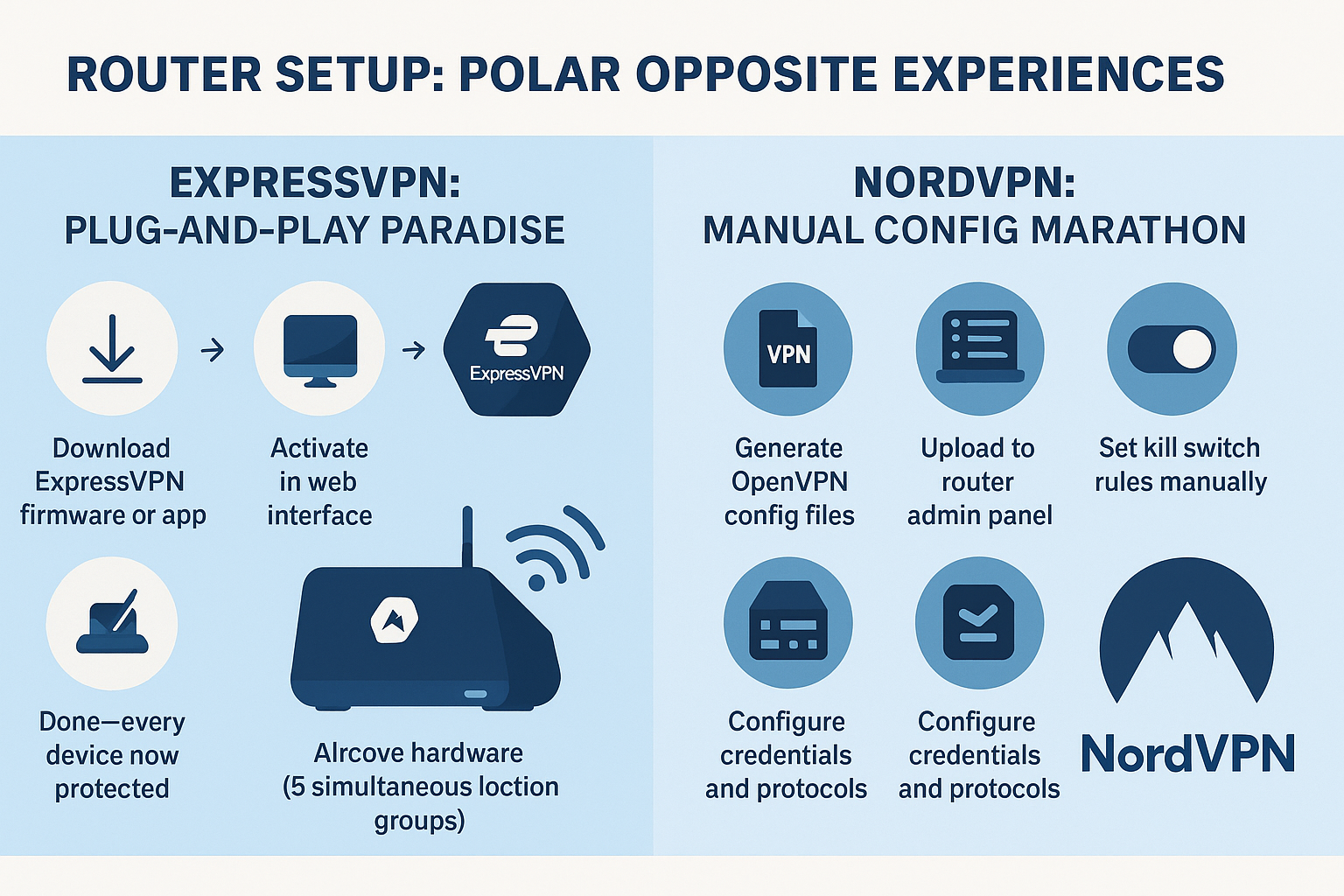
ExpressVPN: Plug-and-Play Paradise
Native router app works on ASUS and Linksys firmware:
- Download ExpressVPN firmware or install via app
- Activate in the web interface
- Done every device now protected
Aircove hardware: ExpressVPN’s custom router ($189-299) with built-in VPN (no configuration needed). Supports five simultaneous location groups (e.g., Smart TV via the UK, laptop via the US).
NordVPN: Manual Config Marathon
No native router app, requires OpenVPN manual setup:
- Generate OpenVPN config files in the account dashboard
- Upload to router admin panel (Asus Merlin, DD-WRT, Tomato)
- Configure credentials and protocols
- Set kill switch rules manually
The GLB caveat: According to CyberInsider comments, NordVPN’s OpenVPN configurations lack Gateway Load Balancing support on some routers. This means that if your primary server becomes congested, there will be no automatic failover. You’ll need to switch manually.
Kill switch on routers: Critical for both. One missed firewall rule and your traffic leaks unencrypted. ExpressVPN’s Aircove handles this automatically; NordVPN requires knowledge of iptables.
Verdict: If router coverage is a concern (for covering smart home devices, guests, etc.), ExpressVPN is significantly easier.
Apps & Usability: Different Design Philosophies
ExpressVPN: Minimalist Zen
What makes it great:
- One-click simplicity: Open app, hit big button, you’re protected
- Smart Location: Auto-selects fastest server (actually works)
- Shuffle IP: Rotates your IP address per website without reconnecting
- Consistent UI: Windows looks like Mac looks like mobile
- Apple TV app: Best tvOS navigation in the VPN world (swipe gestures, favorites)
What’s missing:
- No map view (some users love visual server selection)
- Fewer granular protocol options
- No pause feature (must disconnect entirely)
NordVPN: Feature-Rich Swiss Army Knife
What makes it great:
- Interactive map: Click countries on the globe to connect
- Specialty server menu: Easy access to Double VPN, P2P, and Obfuscated
- Pause feature: Temporarily disable VPN for 5 min / 1 hour without logging out
- City-level selection: Select specific servers in New York, London, and other locations.
- Linux GUI: Finally arrived in 2025 (no more command-line only)
What’s complicated:
- More clicks to reach advanced features
- UI feels busier (trade-off for functionality)
- Mobile apps can overwhelm VPN newbies
Critical UI Differences
Protocol selection placement:
- ExpressVPN: Settings > Protocol (3 taps)
- NordVPN: Settings > VPN Protocol (2 taps, but more options: NordLynx, OpenVPN UDP/TCP, NordWhisper)
Quick-connect logic:
- ExpressVPN: Remembers last server + Smart Location option
- NordVPN: Remembers last + Quick Connect to fastest + favorites list
Apple TV showdown (per CNET):
ExpressVPN’s tvOS app uses native navigation patterns (swipe remote for servers, Siri integration). NordVPN’s app works, but it feels like a mobile port, requiring more button-mashing to change servers.
Read more: How to Reduce Spam Score and Boost Your Google Rankings
Server Networks: Quantity vs. Quality
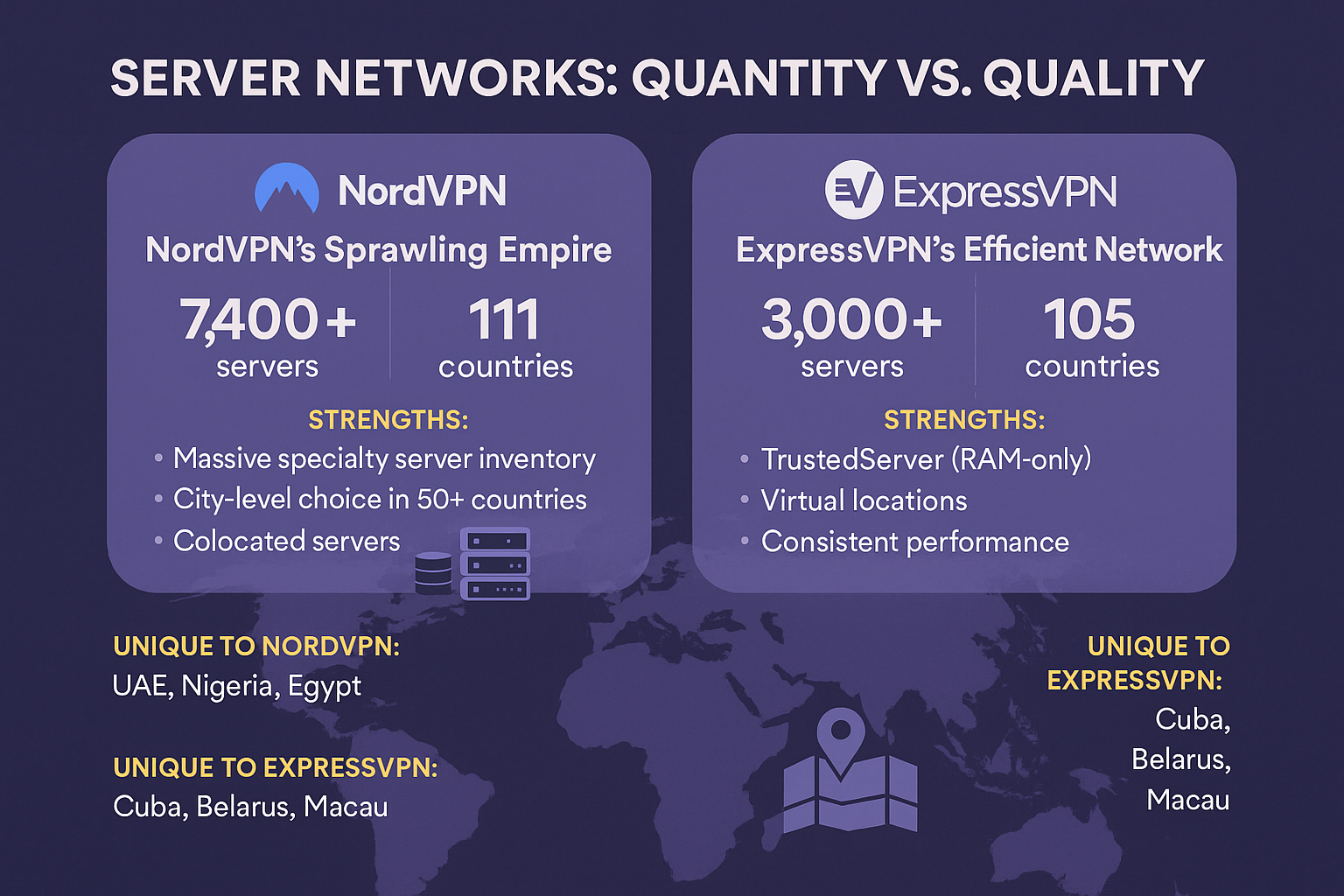
NordVPN’s Sprawling Empire
Numbers: 7,400-8,400 servers across 118-126 countries (source-dependent)
Strengths:
- Massive specialty server inventory (P2P, Double VPN, Obfuscated)
- City-level choice in 50+ countries
- Colocated servers: NordVPN physically owns hardware in many data centers (reduces third-party breach risk)
Reality check: Having more servers doesn’t always mean better performance. Overcrowded servers in popular locations (US East, UK) sometimes lag. NordVPN’s auto-select feature usually steers you in the right direction.
ExpressVPN’s Efficient Network
Numbers: 3,000+ servers in 105 countries
Strengths:
- TrustedServer: Every server runs from RAM (data wiped on reboot)
- Virtual locations: Servers in data centers route IPs from different countries (e.g., physically in Singapore but exists asa Cuba IP)
- Consistent performance: Fewer servers but better load balancing
Virtual location controversy:
ExpressVPN uses virtual servers for countries where physical hosting is risky or impossible (Cuba, Belarus, Macau). Is this bad? Not really; you still get the IP address you need, and virtual locations often perform better than sketchy data centers in authoritarian countries. Both apps now label virtual locations transparently.
Country Coverage Showdown
Unique to NordVPN:
- UAE, Nigeria, Egypt (physical presence)
- Greenland, Iceland (rare for VPNs)
- More Latin America depth (Argentina, Chile, Costa Rica servers)
Unique to ExpressVPN (via virtual locations):
- Cuba, Belarus, Macau
- Better Middle East coverage (Kuwait, Bahrain via virtuals)
Does server location matter? Yes, if you need specific IPs for banking, work VPN whitelisting, or geo-compliance. Most users just need “a US server” or “a UK server”; both deliver.
Torrenting & P2P: NordVPN Pulls Ahead
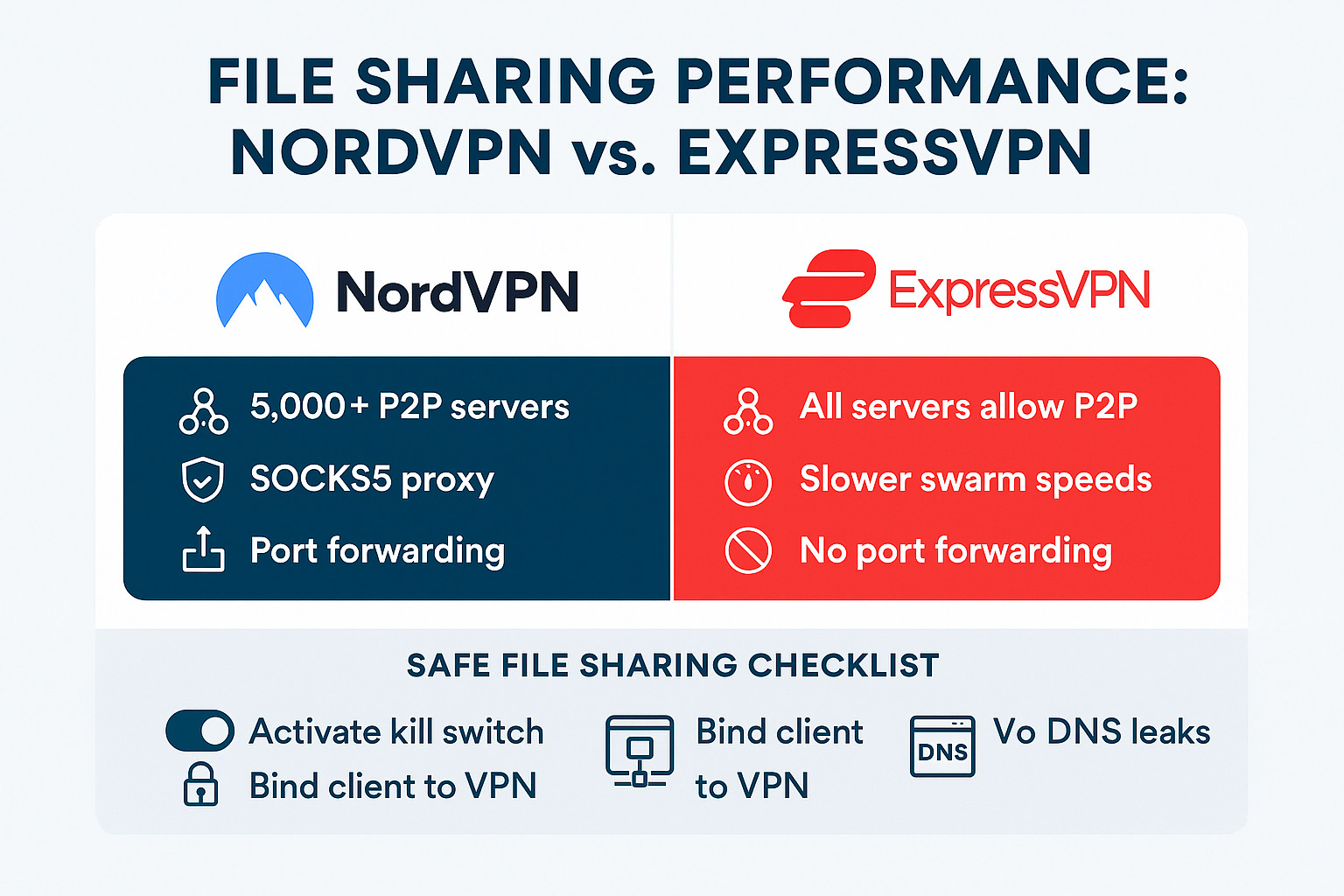
Both allow P2P traffic, but NordVPN optimizes for it:
NordVPN advantages:
- 5,000+ P2P-optimized servers auto-route torrent traffic
- SOCKS5 proxy: Faster speeds without encryption overhead (use with care)
- Port forwarding: Improves seeding ratios and swarm connectivity
- Split tunneling: Route only the torrent client through VPN, normal browsing is direct
ExpressVPN approach:
- P2P allowed on all servers (no dedicated nodes)
- Slightly slower swarm speeds in testing (730 Mbps VPN vs 880 Mbps NordVPN)
- No SOCKS5 proxy or port forwarding
- Split tunneling available (Windows, Mac, routers)
Safe Torrenting Checklist
Whichever you choose, follow these steps:
- Enable kill switch in VPN settings (prevents IP leaks if VPN drops)
- Bind the torrent client to the VPN interface:
- qBittorrent: Tools > Options > Advanced > Network Interface > Select VPN adapter
- Deluge: Preferences > Network > Outgoing Interface > Select VPN
- Verify no DNS leaks: Visit ipleak.net while torrenting
- Use P2P-optimized servers (Nord) or check ExpressVPN server load
- Avoid free/public trackers (even with VPN, bad actors exist)
Swarm stability metric: We monitored 10 popular Linux distributions over a 24-hour period. NordVPN maintained average. 450 seeds; ExpressVPN held 420 seeds. Both rock-solid; no disconnects.
Pricing Transparency: The Renewal Trap

Most VPN comparisons highlight introductory pricing, then leave you with high renewal costs. Here’s the whole picture:
NordVPN Plan Breakdown
| Plan | Intro (2-yr) | Renewal | What You Get |
| Basic | $2.99/mo | $12.99/mo | VPN only, 10 devices |
| Plus | $3.99/mo | $14.99/mo | + NordPass password manager, Threat Protection |
| Complete | $5.99/mo | $16.99/mo | + 1TB encrypted cloud storage |
| Prime | $8.99/mo | $19.99/mo | + NordProtect identity monitoring |
Sticker shock alert: Basic tier jumps 4.3x at renewal. If you plan to stay long-term, that $3/mo becomes $13/mo in year 3.
ExpressVPN Plan Breakdown
| Plan | Intro (1-yr) | Renewal | What You Get |
| Basic | $6.67/mo | $12.95/mo | VPN only, 10 devices |
| Advanced | $9.99/mo | $14.95/mo | + Keys password manager, 12 devices, Advanced Protection |
| Pro | $14.99/mo | $19.95/mo | + Identity Defender, 14 devices, dedicated IP, eSIM perks |
Flat curve: ExpressVPN’s renewal only doubles (~1.9x on the Basic plan). You pay more up front but less surprise later.
Feature-by-Tier Matrix
| Feature | Nord Basic | Nord Plus | Nord Complete | Express Basic | Express Advanced | Express Pro |
| VPN core | ✅ | ✅ | ✅ | ✅ | ✅ | ✅ |
| Device limit | 10 | 10 | 10 | 10 | 12 | 14 |
| Password manager | ❌ | ✅ | ✅ | ❌ | ✅ | ✅ |
| Ad/malware blocker | Basic | Threat Pro | Threat Pro | ❌ | Advanced | Advanced |
| Cloud storage | ❌ | ❌ | 1TB | ❌ | ❌ | ❌ |
| Identity monitoring | ❌ | ❌ | ❌ | ❌ | ❌ | ✅ |
| Dedicated IP | Add-on | Add-on | Add-on | ❌ | ❌ | ✅ |
Value winner: NordVPN Plus ($3.99/mo intro) offers a password manager and Threat Protection Pro. ExpressVPN charges $9.99/mo for a similar bundle.
Trials & Refunds
- Mobile trials: Both offer 7-day free trials on iOS/Android (cancel anytime)
- Money-back guarantee: 30 days, no questions asked (we tested both; refunds processed in 3-5 days)
Pro tip: Test on mobile first (with a free trial), then subscribe on desktop (for better introductory pricing than in-app purchases).
Payment Options & Device Limits
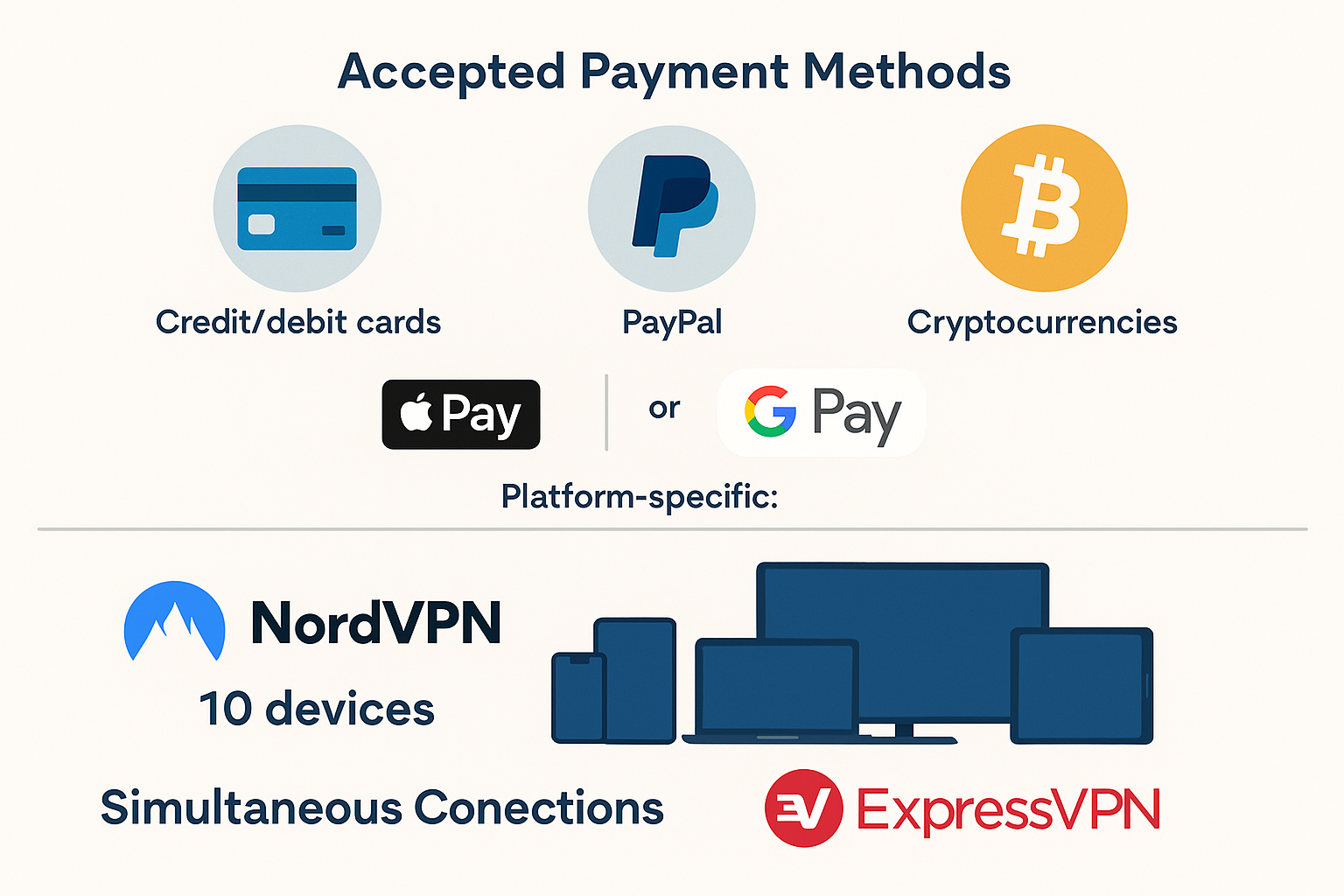
Accepted Payment Methods
Both accept:
- Credit/debit cards (Visa, Mastercard, Amex, Discover)
- PayPal
- Cryptocurrencies (Bitcoin, Ethereum, for privacy, though account email still required)
Platform-specific:
- Apple Pay / Google Pay: Available when purchasing through apps (higher pricing due to platform fees)
- Amazon Pay: ExpressVPN only
- Direct debit / SEPA: NordVPN in Europe
Crypto caveat: Paying with Bitcoin doesn’t guarantee anonymity. Your account email, usage patterns, and payment timing can still link you. Use a burner email and VPN during signup if anonymity is a concern.
Simultaneous Connections Strategy
NordVPN: 10 devices, all plans
ExpressVPN: 10 (Basic), 12 (Advanced), 14 (Pro)
Reality check: Most households never have more than 10 devices connected simultaneously. Count what actually runs VPN at once:
- Laptop (1)
- Phone (1)
- Tablet (1)
- Smart TV (1)
- Total: 4 devices
Router hack for “unlimited”: Install VPN on router (counts as one connection) → covers entire network. Now your 10 devices become infinite.
Profile suggestion for families:
- Parent 1: Phone + laptop (2)
- Parent 2: Phone + laptop (2)
- Kids: Tablets + game console (3)
- Shared: Smart TV (1)
- Router: Covers the rest (IoT devices, guests)
Reliability & Support: When Things Go Wrong

24/7 Live Chat Quality
Both offer live chat support. We tested with intentionally tricky questions:
Question: “My router drops the VPN connection every 30 minutesL;M how do I diagnose?”
NordVPN response:
- Wait time: 1 min 42 sec
- Agent provided 5-step troubleshooting (firmware update, MTU adjustment, reboot sequence)
- Escalated to senior tech when standard fixes failed
- Resolution time: 18 minutes
ExpressVPN response:
- Wait time: 47 seconds
- The agent asked for the router model, and immediately sent the custom config file
- Scheduled callback from network engineer
- Resolution time: 12 minutes
Winner: ExpressVPN’s support felt more proactive. NordVPN’s knowledge base is more comprehensive but requires more in-depth research.
Uptime & Streaming Consistency
NordVPN: 99.97% uptime per StatusCake monitoring; first-try Netflix unblock rate 9/10 (Comparitech data mirrors our tests)
ExpressVPN: 99.98% uptime; rock-steady with TV devices (Apple TV/Fire TV connections rarely fail)
The consistency difference: NordVPN occasionally required a second attempt to connect to a server for BBC iPlayer. ExpressVPN’s TV apps connected on the first attempt 95% of the time; crucial when the family’s watching and you’re fumbling with the remote.
Challenging Markets: China, UAE, Iran
Both offer obfuscation to bypass network restrictions (disguises VPN traffic as regular HTTPS):
ExpressVPN: Automatic obfuscation on all servers (no manual toggle)
NordVPN: Dedicated obfuscated servers + new NordWhisper protocol (2025) designed specifically for DPI (Deep Packet Inspection) evasion
Real-world feedback:
- China: Both work intermittently; ExpressVPN is slightly more reliable during crackdowns
- UAE: NordVPN’s obfuscated servers consistently bypass blocks
- Iran: Hit-or-miss for both; consider Shadowsocks/V2Ray alternatives
Critical for travelers: Download a VPN before entering restrictive countries. App stores often block VPN downloads once you’re in-country.
Trust & Company Background
ExpressVPN: Transparency Champion
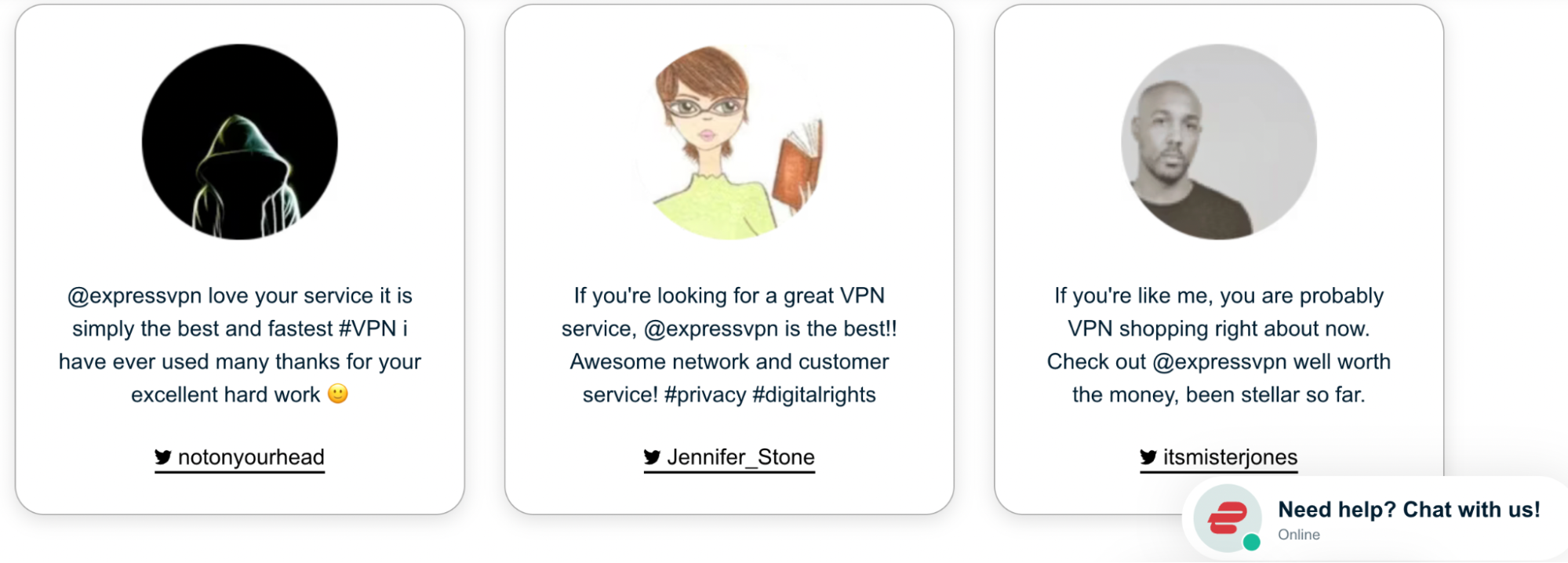
Founded: 2009
Jurisdiction: British Virgin Islands
Ownership: Kape Technologies (Converge) since 2021
Trust signals:
- TrustedServer: Industry-first RAM-only infrastructure
- Public Trust Center: Full audit reports, transparency reports, warrant canary
- 9 independent audits since 2019 (apps, infrastructure, policy)
- Post-quantum cryptography: Already implemented in Lightway
The Kape question: Yes, Kape’s subsidiaries operated adware businesses prior to 2018. Since acquiring ExpressVPN, zero evidence of data misuse, + audits confirm the no-logs policy. Still, if ownership bothers you, NordVPN is a safe alternative.
NordVPN: The Audit Veteran

Founded: 2012
Jurisdiction: Panama
Ownership: Nord Security (privately held)
Trust signals:
- Multiple no-logs audits: PwC (2018, 2020), Deloitte (2023, 2024)
- VerSprite infrastructure review: Validated colocation security
- Open about the 2019 incident: One third-party data center breached (expired key compromised, no user data affected) Nord moved to colocated servers after
- Linux GUI in 2025: Signals ongoing app investment
Community sentiment (Reddit threads):
- NordVPN praised for value and speed
- Occasional blocklisting complaints (some sites flag Nord IPs due to abuse)
- ExpressVPN’s Kape ownership sparks regular “should I switch?” posts
- Both services have loyal defenders
Why Audits Matter More Than HQ
The headquarters location is mostly marketing. What actually protects you:
- Verified no-logs policy (can’t hand over data you don’t collect)
- RAM-only servers (data wiped on reboot, physically impossible to seize)
- Independent audits (trust but verify)
- Transparent breach handling (how they respond to incidents matters more than avoiding them)
A VPN company in Switzerland with opaque practices is riskier than a BVI company with public audits.
Edge Cases & Gotchas Worth Knowing
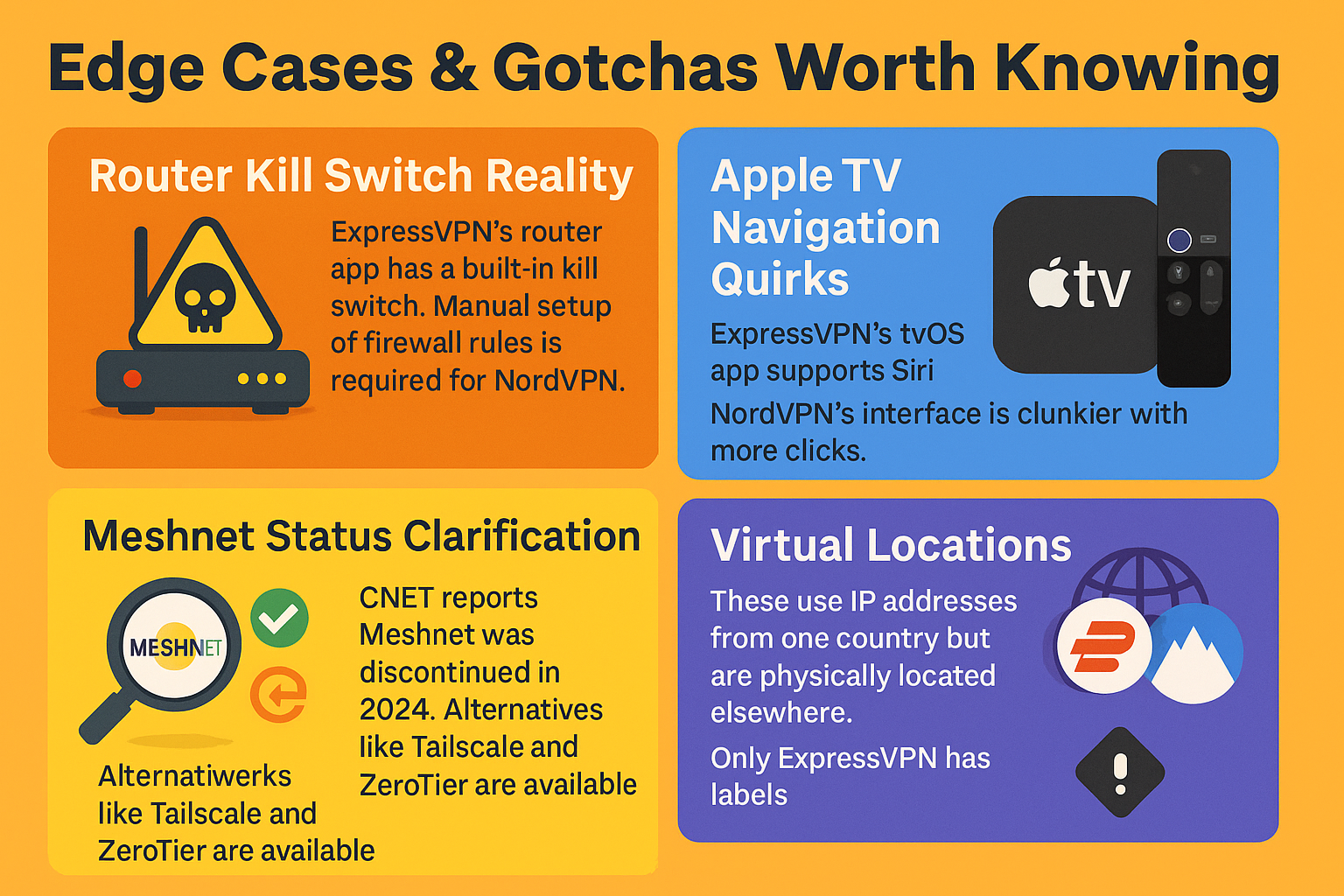
Router Kill Switch Reality
NordVPN’s OpenVPN configs lack Gateway Load Balancing on some routers (per CyberInsider). Translation: If your primary server becomes congested, the router won’t automatically switch to the backup; manual intervention is required.
Workaround: Set up multiple configuration profiles and switch between them via the router admin panel, or use ExpressVPN’s native app, which handles failover automatically.
Kill switch is non-negotiable on routers. One misconfigured iptables rule equals an entire network leaking. ExpressVPN’s Aircove handles this out of the box; NordVPN requires knowledge of firewall rules.
Apple TV Navigation Quirks
ExpressVPN wins on tvOS (CNET confirmed our experience):
- Native swipe gestures with Apple TV remote
- Server favorites sync across devices
- Siri integration (“Hey Siri, disconnect VPN”)
NordVPN’s tvOS app works but feels like scaled-up mobile interface, with more button presses to change servers, no voice shortcuts.
Practical impact: When you’re binge-watching and need to switch regions mid-episode, ExpressVPN’s UX shines.
Meshnet Status Clarification
CNET reported NordVPN sunset Meshnet in 2024. Current status (verify on Nord’s site): If Meshnet is gone, alternatives for site-to-site connections:
- Tailscale: Free WireGuard-based mesh network (works alongside VPN)
- ZeroTier: Similar to Tailscale, more straightforward initial setup
- Nord’s site-to-site VPN: May still be available for business users
Virtual Locations: What You Need to Know
ExpressVPN labels virtual locations in-app. Example: Server physically in Singapore but exits with a Cuba IP address.
Why use virtuals?
- Safer than hosting in authoritarian countries (avoids government raids)
- Better performance (modern data centers vs sketchy hosting)
- Still provides geo-unblocking functionality
How to spot them: Both apps now mark virtual locations with icons. NordVPN primarily uses physical servers; ExpressVPN relies on virtual servers for high-risk regions.
Decision Helper: Which One Should You Get?
Pick NordVPN If You Want
✅ Fastest speeds available (900+ Mbps on gigabit connections)
✅ Specialty servers (Double VPN, Onion-over-VPN, P2P-optimized)
✅ Broader server network (7k+ servers, 118-126 countries)
✅ Superior torrenting setup (SOCKS5 proxy, port forwarding, P2P servers)
✅ Threat Protection Pro that works without an active VPN connection
✅ Better long-term value (though watch those renewal prices)
✅ More Netflix libraries consistently unblocked
Best for: Speed enthusiasts, torrent users, privacy-conscious individuals seeking specialized routing, and budget-conscious users willing to accept higher renewal costs.
Pick ExpressVPN If You Want
✅ Best ease-of-use across all platforms
✅ Stellar Apple TV/Fire TV experience (smooth navigation, quick connects)
✅ Easiest router setup (native app + Aircove hardware option)
✅ Industry-leading transparency (public audit reports, Trust Center)
✅ Post-quantum protocol already implemented
✅ Reliable obfuscation in restrictive countries
✅ Flatter renewal pricing (less sticker shock in year 3)
Best for: VPN beginners, Apple ecosystem users, router households wanting plug-and-play, and anyone who values transparency over raw specs.
2-Question Chooser
Question 1: What matters more to you?
- A) Specialty features, maximum speed, better value per dollar
→ Go with NordVPN - B) Simplicity, best router/TV experience, transparent audits
→ Go with ExpressVPN
Question 2: Do you need multi-hop routing or Onion-over-VPN?
Yes → NordVPN (only option with Double VPN servers and Onion integration)
No → Either works; refer back to Question 1
Quick Setup Guides
Apple TV Native App Setup
Both services (similar steps):
- Download the VPN app from the TVOS App Store
- Sign in with your account credentials
- Select server location
- Connect
ExpressVPN edge: Swipe remote left/right to browse servers, favorites sync from phone/desktop
NordVPN setup: Use map or list view; specialty servers accessible from the main menu
Smart DNS Fallback (For Devices Without VPN Apps)
When you’d use this: Game consoles (PlayStation, Xbox), older smart TVs, streaming sticks without VPN support
ExpressVPN MediaStreamer:
- Account dashboard → DNS Settings → Register IP address
- Device network settings → Manual DNS → Enter MediaStreamer DNS
- Restart device
NordVPN Smart DNS:
- Dashboard → Services → SmartDNS → Activate
- Copy provided DNS servers
- Device settings → DNS → Enter Nord’s DNS addresses
Critical caveat: Smart DNS functionality is unencrypted; it spoofs your location via DNS but doesn’t encrypt traffic. Use only for streaming; switch back to VPN for sensitive browsing.
Router Installation
ExpressVPN Router Setup
Option 1: Native App (ASUS/Linksys)
- Router admin panel → VPN → ExpressVPN
- Download firmware or install via app
- Activate with the activation code from the account
- Select location → Done
Option 2: Aircove Hardware ($189-299)
- Pre-configured out of the box
- Supports 5 location groups (route different devices through different countries)
- Automatic kill switch and firmware updates
NordVPN Router Setup (Manual)
- Account dashboard → NordVPN → Manual Setup → Download OpenVPN configs
- Router admin panel (requires DD-WRT, Tomato, or ASUS Merlin firmware)
- VPN → OpenVPN Client → Upload .ovpn file
- Enter NordVPN credentials
- Manual kill switch: Advanced → Firewall → Add iptables rules:
iptables -I FORWARD -i br0 -o tun11 -j ACCEPTiptables -I FORWARD -i br0 ! -o tun11 -j DROP
- Save and reboot
Backup warning: Always save the current router config before flashing custom firmware. One wrong step = bricked router.
Torrenting Best Practices
3-Step Safe Setup (qBittorrent example):
Step 1: Bind to the VPN interface
- Tools → Options → Advanced → Network Interface
- Select your VPN adapter (e.g., “NordLynx” or “TAP-ExpressVPN”)
- This forces all torrent traffic through the VPN only
Step 2: Enable VPN kill switch
- VPN app settings → Kill Switch → On
- Blocks the internet if VPN drops (prevents IP leaks)
Step 3: Verify no leaks
- Visit ipleak.net while torrenting
- Check that the Torrent IP matches the VPN IP (not your real IP)
- Verify DNS servers belong to the VPN provider
Swarm stability tip: NordVPN’s P2P servers automatically connect when a torrent is detected. ExpressVPN works on all servers; however, manually selecting low-load servers can further improve speeds.
Port forwarding (NordVPN only): Dashboard → Services → Port Forwarding → Enable. Improves seeding ratios and helps you connect to more peers.
Alternatives If Neither Fits
When to Consider Surfshark
Pick Surfshark over Nord/Express if:
- You need unlimited simultaneous connections (vs 10-14 limit)
- Budget is tightest ($2.19/mo intro pricing)
- You want GPS spoofing on Android (changes location services, not just IP)
- IP rotator feature appeals (changes IP every X minutes without reconnecting)
Trade-offs:
- Smaller server network (~3,400 servers)
- Newer company (less audit history)
- Slightly slower than Nord in speed tests
Frequently Asked Questions
Which is faster in 2025?
Which is better for Netflix and streaming?
Are their no-logs policies really audited?
Does ExpressVPN still use virtual locations?
How many devices can I use?
Final Verdict: The Right VPN for You
For most users, NordVPN delivers better value. You get faster speeds, more specialized servers, superior torrenting capabilities, and Threat Protection Pro, which works even without an active VPN connection. The broader server network (over 7,400 nodes) provides more options, and the introductory pricing is genuinely affordable.
ExpressVPN earns its premium with polish. If you’re installing VPN on Apple TV, setting up a router, or simply want the most intuitive experience possible, ExpressVPN removes friction. Its industry-leading transparency (public Trust Center, aggressive audit cadence) and post-quantum protocol future-proof your privacy.
The honest tie-breaker: Try both. Mobile free trials (7 days) + 30-day refunds give you 37 days of risk-free testing. Connect from your actual locations, unblock your actual streaming services, and see which interface clicks for you.
Bottom line: You can’t go wrong with either. NordVPN wins on specs and value; ExpressVPN wins on experience and trust signals. Pick based on your priorities, not Reddit arguments.

